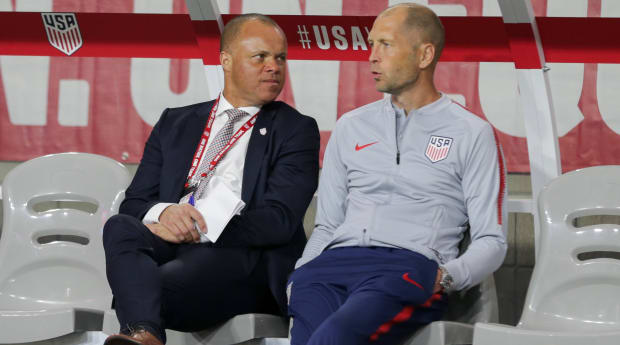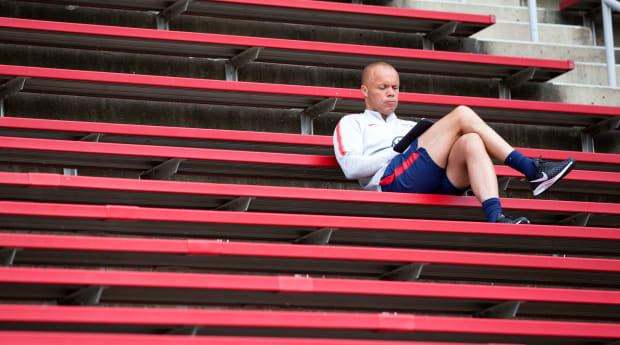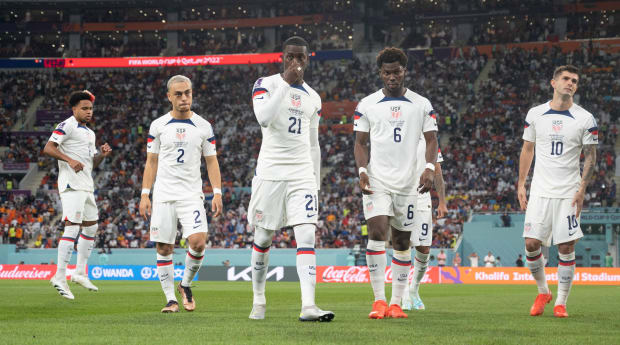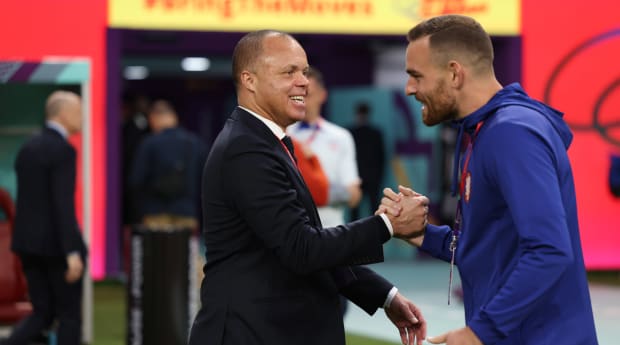The destination was pretty much expected, perhaps even predictable, despite the plot twists, close calls and a high-profile pelvic contusion suffered along the way. The 16th-ranked U.S. men’s national team was eliminated in the Qatar World Cup’s round of 16.
The precocious Americans had the talent to finish above Wales and Iran in a tight group topped by England, and they did. But the U.S. didn’t have enough to win a second knockout match in 92 years, or to defeat another European power (there’s been one win in 20 World Cup meetings since 1990). They were who we thought they were.
Instead, the shocks came once the U.S. lost to the Dutch and left Qatar. From the controversy, revelations and subsequent investigation concerning former coach Gregg Berhalter and Gio Reyna’s parents, to the departures of men’s GM Brian McBride and U.S. Soccer sporting director Earnie Stewart, one shake-up after another has left the national team in limbo a bit more than three years out from the North American World Cup.
USSF president Cindy Parlow Cone has said that a full leadership group probably won’t be in place until later this summer, after the 2023 Concacaf Gold Cup.
Meanwhile, Stewart is returning to his native Netherlands to serve as PSV Eindhoven’s director of football. His last day at U.S. Soccer was Wednesday. When Stewart was appointed men’s GM in summer 2018 and then promoted to sporting director the following year, the three-time U.S. World Cup veteran and former Eredivisie and MLS club executive became the first experienced soccer person entrusted to make the federation’s biggest soccer decisions. That was significant. Stewart oversaw the hiring of McBride, Berhalter, women’s GM Kate Markgraf and women’s national team coach Vlatko Andonovkski, among others, while trying to set an overall direction for development, culture and playing style throughout the USSF pyramid.

IMAGO/ZUMA Wire
After the American men overtook Mexico atop Concacaf, qualified for the World Cup with the planet’s youngest team and booked their return to the Olympics, Stewart, 53, inked an extension last summer. There could be no clearer sign that Parlow Cone and the board believed Stewart was successfully building a long-term technical foundation. Results in Qatar wouldn’t change that. So it appeared he’d be around to guide this accomplished and ambitious generation through a home World Cup. Stewart’s plan this winter was to start with a comprehensive review of the men’s program that would culminate in a decision on its next coach and, perhaps, a redefinition of the GM role.
But plans changed. Stewart said he struggled with the finality of the Americans’ elimination in early December, and, as the calendar turned, the landscape shifted considerably. The investigation into the Berhalter-Reyna affair, which included a 1991 incident of domestic violence acknowledged by the out-of-contract manager, would delay any conclusions about his candidacy. That investigation remains in progress.
Family concerns also emerged. Stewart’s wife and two children have remained in the Netherlands while he’s been working in Chicago. His wife was visiting him in December to discuss their situation when PSV came calling. It wasn’t the first club to express interest in Stewart, but its size, potential and proximity to home made the difference. Stewart grew up in Uden, about 20 miles north of Eindhoven, attending PSV matches and training sessions. His parents still live there, while his in-laws are in nearby Zeeland.
“I went from high energy leading into the game against Holland, and then the next day being that the tournament is over, it was something I’d never experienced in all my life,” Stewart said of the abrupt end of the World Cup journey. “I found that really tough to get back my energy level and I wanted to do that during Christmas. But with all this happening and what we were talking about, like it kind of stayed there for me, which was tough.”
As the commotion centered on Berhalter and the Reynas, Stewart was discussing his future with Parlow Cone and USSF CEO JT Batson. His exit was announced Jan. 26, while the U.S. men were in camp under interim manager Anthony Hudson.
“It’s the right time, right now, and then I can be there to support my family,” Stewart said. “Rationally, it’s the best decision I can make. Emotionally it’s a little different because of everything that’s happened. It’s difficult. But it does make it easier that at the same time, I have the opportunity to work for one of the biggest clubs in Holland. It’s insane that this couples together.”
So Stewart’s formal review of the men’s program won’t be finished, in part because Berhalter now seems so unlikely to return. Conversations among coaches and staff began following the World Cup but were frequently interrupted. Stewart has said that he’s always keeping track of external coaching prospects and their potential availability but stressed that he hadn’t progressed far enough to begin reaching out to specific individuals. Former Real Madrid manager Zinedine Zidane was among those rumored to have been contacted.
“I read this stuff and I think to myself, I’m the guy who knows about who we reached out to and who we didn’t reach out to,” Stewart said. “I can say through this review process that nobody’s been talked to. Nobody.”
Regarding any review, he said, “I’m going to make myself available for the new sporting director, or a new GM or whomever, to go through that. So that’s what we’ve agreed upon, which I do with a lot of love and pleasure, but it’s up to the new person to—I don’t want to hinder him or her in anything.”

Cara Owsley/The Enquirer
U.S. Soccer hired Sportsology, a New York consulting firm with roots in England, to advise on the sporting director search. Parlow Cone said she hoped to have Stewart’s successor in place by the start of this summer’s Women’s World Cup. But the decision to renew Stewart last year sends a signal that the federation was happy with his work and the direction of the teams under his watch. He’s patient, process-oriented and a believer that the growth of American men’s soccer is a generational journey. Decisions are grounded in data and a long-term perspective. Stewart also believes coaches, especially at the national team level, must be a cultural fit. Parlow Cone, Batson and the federation board seem unlikely to appoint someone who represents a sharp deviation from those values.
“The way I look at a sporting director role, or technical director role, is not so much me coming in or a sporting director coming in and then, ‘This is the way I’m going to do things.’ What we do is translate the thoughts of the organization and where they want to go,” Stewart said.
When asked whether U.S. Soccer might start over with a clean slate, he added, “I would certainly hope not.”
“I believe in consistency, continuity and those things, and I think the organization has done a really good job. A lot of people put a lot of hard work into the last four years in creating how we want to play,” he explained. “From a DNA standpoint, what that style of play needs to look like, roles and responsibilities, data collection around that, so that we can finally get to some KPIs [key performance indicators].
“In essence, the only KPI that there is right now if you don’t do data collection is winning and losing. That’s all you have, [along with] what somebody subjectively thinks about something without data collection. So with those roles and responsibilities and the data collection, then we can actually start, hopefully in the future, making some different choices, or better choices, around players that are moving up the pathway into our [national teams]. And it’d be a shame to put a halt to all of that, because then it starts all over again.”
Some stability is inevitable, considering the state of the men’s player pool. There’s going to be a lot of on-field continuity from the 2022 cycle through ’26. The U.S. fielded the youngest lineups at the World Cup, and this group is now entering its prime. Stewart said he was happy with the performance, the culture and the coaching in Qatar, and that only a consistent commitment to player development will help lift the U.S. to the level of the Dutch and other title contenders.
“I think Gregg has done a really good job. I think the players have done an outstanding job in where we are right now. and they’re going to get better through experience. … Four years ago, I probably would have signed a piece of paper to be able to play that way. So that says a lot about Gregg and his coaching staff and implementing our thoughts and getting there,” Stewart said, defending the performance of the manager he hired—a decision that now anchors his executive legacy.
“But is it going to be the difference between going from that good team to becoming world champion? That’s the question and that lies all in development,” he added. “We can’t go down the depth chart just like that. It’s a little bit different for us.”
The top-heavy nature of Berhalter’s squad, not to mention the lack of a consistent cutting edge in attack, was exposed by the Netherlands in Al Rayyan, where the U.S. was sluggish and lacking in precision. The intensity and razor-thin margins of three difficult group-stage games in nine days had taken their toll, Stewart concluded.
“I’m happy with the way that we played, but it cost us so much energy to score goals,” he said. “What happens if you have trouble scoring goals is that you’re chasing goals all game, and you can’t do that four times for 90 minutes. It’s impossible. And what helps then is that you go into a place after you’ve scored a goal or two goals that you can just rotate [players] after that and then get through your group where you are fresher.”
But an environment that encourages ambition and improvement is in place, Stewart argued, and that’s something he hopes U.S. Soccer recognizes as it chooses his successor.
“When I got [to Qatar], I found a team and staff that thought they could become world champion. That to me is like one of the most powerful things ever, apart from it being reality. At least the mindset was totally there,” he said. “You could just feel the energy. The way they talked about it. The way they went about video. The way they interacted during the games, in preparing on the field and off the field—concentration, the group chemistry.”
“This was huge for us,” Stewart said of his priorities when he took over and set about rebuilding the program. “It’s something that we experienced in ’98, as an example. We never wanted ’98 to happen again.”

IMAGO/ZUMA Wire
That 1998 World Cup in France was infamous for dysfunction that derailed the U.S. There were problems again in Qatar, of course. But even though the fallout from the Reyna-Berhalter affair has left the manager’s return improbable and prompted Claudio’s resignation from his sporting director role at Austin FC, Stewart said the team held firm internally. Rather than look at Gio’s early behavior as a sign that the culture had failed, Stewart regards his return to the field—the 20-year-old played the second half against the Dutch—as an indication of its strength.
“In this whole discussion about what happened during the World Cup, I view it actually differently, in the sense that we have something that happened, it was dealt with and we moved on from it,” Stewart said. “That’s as simple as I can put it, and that says something about the culture from players to staff. We got through it. We weren’t the only ones where something happened. You just deal with it, and it got to a place where Gio was playing again.
“Then do things happen later on that should not have? Agreed, totally.”
Stewart said the investigation, which is being conducted by an independent law firm, must conclude so there are no “questions for the new sporting director” and so that “everybody can move on with their lives.” Stewart, McBride and Berhalter are among those moving on, but Hudson will be leading the men into next month’s Nations League games and, almost certainly, the Gold Cup. Much of the technical department—sports science and performance personnel, assistant coaches and analysts—remains in place.
Hudson and colleagues have been visiting players across Europe this month, and the work continues on recruiting several prized dual nationals even as Stewart and McBride depart. Club América forward Alejandro Zendejas, FC Cincinnati striker Brandon Vazquez and Real Sociedad defender Jonathan Gómez were invited to the recently concluded January camp. And 21-year-old forward Folarin Balogun, the New York City–born Reims marksman who’s on loan from Arsenal and is co-leading France’s Ligue 1 in scoring, remains on the radar. Stewart had hoped that Hudson might meet with Balogun this week, and, although it wound up not working out, lines of communication remain open.
The connections and frequent conversations that have played such a vital role in the culture Stewart and Berhalter lauded must remain a big part of the 2026 cycle, he stressed. And in Stewart’s opinion, those hoping for the hiring of a big-name foreign coach like Zidane—even if the USSF is willing to break the bank for someone like him—should keep that in mind. It’s not necessarily about nationality, Stewart said. It’s about familiarity. And while strangers occasionally lead a foreign nation on a long World Cup run—Stewart’s Dutch countryman Guus Hiddink taking 2002 host South Korea to the semis comes to mind—that’s not a reliable way to build a consistent World Cup contender.
“It’s sustainable success, not one time. How many times did South Korea do that after that?” Stewart asked. “It doesn’t mean once again that we can’t have a run with it. We had Bora [Milutinović] and had a decent 1994 for where we were with soccer in the United States. And I’m also not saying that a foreign coach can’t adapt to the cultures that there are, because that’s not the case. But I do think that aspect of it—culture, understanding the landscape, understanding the players, the environments that need to be created—is really important. And that already eliminates a lot of people, a lot of coaches. There needs to be a cultural fit.”
Stewart still believes a national team manager should work primarily out of U.S. Soccer’s Chicago office. While his successor can disagree with that or anything else, and very well could move in a different direction, the federation’s confidence in Stewart and its satisfaction with his performance suggests it’s more likely to hire someone who agrees with at least some of his big-picture philosophy.
His first day on the job in Eindhoven will be March 1. PSV is in fourth place and four points out of first in the Eredivisie, and could very well become a destination for American players once Stewart is in charge.
“It would be stupid not to think of my network when I’m there,” he said.

IMAGO/ZUMA Wire
Meanwhile, he thinks the U.S. men will be fine. There’s a firm foundation in place despite recent upheaval, he believes. The federation “wants to make the best choice for the best coach,” he said, and isn’t immediately ruling out potential candidates because of money. And the job, despite the national team’s round-of-16 pedigree, remains desirable—even to foreign coaches.
“I think if you take every big coach that worked at top clubs but hadn’t been a national team coach yet, they’d probably say if there’s something that they still want to do, it’s that. And you have ’26 on the horizon, which is just going to be the best tournament ever. If there’s one thing that we’re really good at, that’s it,” he said.
“Then the other piece is, everybody wants to be in the States. It’s an amazing place to live. So like just a combination of those, you’re going to attract talent.”







